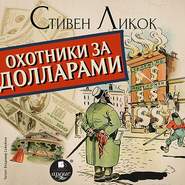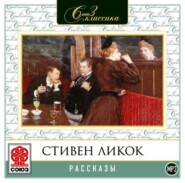По всем вопросам обращайтесь на: info@litportal.ru
(©) 2003-2025.
✖
Winsome Winnie and other New Nonsense Novels
Автор
Год написания книги
2019
Настройки чтения
Размер шрифта
Высота строк
Поля
At that moment Croyden pointed with a cry towards the sea.
"Look," he said, "for Heaven's sake, look!"
He turned.
Less than a quarter of a mile away we could see a large white motor launch coming round the corner. The deck was gay with awnings and bright dresses and parasols.
"Great Heavens!" said Croyden. "I know that launch. It's the Appin-Joneses'."
"The Appin-Joneses'!" cried Clara. "Why, we know them too. Don't you remember, Harold, the Sunday we spent with them on the Hudson?"
Instinctively we had all jumped for cover, behind the rocks.
"Whatever shall we do?" I exclaimed.
"We must get our things," said Edith Croyden. "Jack, if your suit is ready run and get it and stop the launch. Mrs. Borus and Mr. Borus and I can get our things straightened up while you keep them talking. My suit is nearly ready anyway; I thought some one might come. Mr. Borus, would you mind running and fetching me my things, they're all in a parcel together? And perhaps if you have a looking-glass and some pins, Mrs. Borus, I could come over and dress with you."
* * * * *
That same evening we found ourselves all comfortably gathered on the piazza of the Hotel Christopher Columbus. Appin-Jones insisted on making himself our host, and the story of our adventures was related again and again to an admiring audience, with the accompaniment of cigars and iced champagne. Only one detail was suppressed, by common instinct. Both Clara and I felt that it would only raise needless comment to explain that Mr. and Mrs. Croyden had occupied separate encampments.
Nor is it necessary to relate our safe and easy return to New York.
Both Clara and I found Mr. and Mrs. Croyden delightful travelling companions, though perhaps we were not sorry when the moment came to say good-bye.
"The word 'good-bye,'" I remarked to Clara, as we drove away, "is always a painful one. Oddly enough when I was hunting the humpo, or humped buffalo, of the Himalayas–"
"Do tell me about it, darling," whispered Clara, as she nestled beside me in the cab.
VI
THE KIDNAPPED PLUMBER A TALE OF THE NEW TIME
(Being one chapter—and quite enough–from the Reminiscences of an Operating Plumber)
"Personally," said Thornton, speaking for the first time, "I never care to take a case that involves cellar work."
We were sitting—a little group of us—round about the fire in a comfortable corner of the Steam and Air Club. Our talk had turned, as always happens with a group of professional men, into more or less technical channels. I will not say that we were talking shop; the word has an offensive sound and might be misunderstood. But we were talking as only a group of practising plumbers—including some of the biggest men in the profession—would talk. With the exception of Everett, who had a national reputation as a Consulting Barber, and Thomas, who was a vacuum cleaner expert, I think we all belonged to the same profession. We had been holding a convention, and Fortescue, who had one of the biggest furnace practices in the country, had read us a paper that afternoon—a most revolutionary thing—on External Diagnosis of Defective Feed Pipes, and naturally the thing had bred discussion. Fortescue, who is one of the most brilliant men in the profession, had stoutly maintained his thesis that the only method of diagnosis for trouble in a furnace is to sit down in front of it and look at it for three days; others held out for unscrewing it and carrying it home for consideration; others of us, again, claimed that by tapping the affected spot with a wrench the pipe might be fractured in such a way as to prove that it was breakable. It was at this point that Thornton interrupted with his remark about never being willing to accept a cellar case.
Naturally all the men turned to look at the speaker. Henry Thornton, at the time of which I relate, was at the height of his reputation. Beginning, quite literally, at the bottom of the ladder, he had in twenty years of practice as an operating plumber raised himself to the top of his profession. There was much in his appearance to suggest the underlying reasons of his success. His face, as is usual with men of our calling, had something of the dreamer in it, but the bold set of the jaw indicated determination of an uncommon kind. Three times President of the Plumbers' Association, Henry Thornton had enjoyed the highest honours of his chosen profession. His book on Nut Coal was recognized as the last word on the subject, and had been crowned by the French Academy of Nuts.
I suppose that one of the principal reasons for his success was his singular coolness and resource. I have seen Thornton enter a kitchen, with that quiet reassuring step of his, and lay out his instruments on the table, while a kitchen tap with a broken washer was sprizzling within a few feet of him, as calmly and as quietly as if he were in his lecture-room of the Plumbers' College.
"You never go into a cellar?" asked Fortescue. "But hang it, man, I don't see how one can avoid it!"
"Well, I do avoid it," answered Thornton, "at least as far as I possibly can. I send down my solderist, of course, but personally, unless it is absolutely necessary, I never go down."
"That's all very well, my dear fellow," Fortescue cut in, "but you know as well as I do that you get case after case where the cellar diagnosis is simply vital. I had a case last week, a most interesting thing—" he turned to the group of us as he spoke—"a double lesion of a gas-pipe under a cement floor—half a dozen of my colleagues had been absolutely baffled. They had made an entirely false diagnosis, operated on the dining-room floor, which they removed and carried home, and when I was called in they had just obtained permission from the Stone Mason's Protective Association to knock down one side of the house."
"Excuse me interrupting just a minute," interjected a member of the group who hailed from a distant city, "have you much trouble about that? I mean about knocking the sides out of houses?"
"No trouble now," said Fortescue. "We did have. But the public is getting educated up to it. Our law now allows us to knock the side out of a house when we feel that we would really like to see what is in it. We are not allowed, of course, to build it up again."
"No, of course not," said the other speaker. "But I suppose you can throw the bricks out on the lawn."
"Yes," said Fortescue, "and sit on them to eat lunch. We had a big fight in the legislature over that, but we got it through."
"Thank you, but I feel I am interrupting."
"Well, I was only saying that, as soon as I had made up my mind that the trouble was in the cellar, the whole case was simple. I took my colleagues down at once, and we sat on the floor of the cellar and held a consultation till the overpowering smell of gas convinced me that there was nothing for it but an operation on the floor. The whole thing was most successful. I was very glad, as it happened that the proprietor of the house was a very decent fellow, employed, I think, as a manager of a bank, or something of the sort. He was most grateful. It was he who gave me the engraved monkey wrench that some of you were admiring before dinner. After we had finished the whole operation—I forgot to say that we had thrown the coal out on the lawn to avoid any complication—he quite broke down. He offered us to take his whole house and keep it."
"You don't do that, do you?" asked the outsider.
"Oh no, never," said Fortescue. "We've made a very strict professional rule against it. We found that some of the younger men were apt to take a house when they were given it, and we had to frown down on it. But, gentlemen, I feel that when Mr. Thornton says that he never goes down into a cellar there must be a story behind it. I think we should invite him to relate it to us."
A murmur of assent greeted the speaker's suggestion. For myself I was particularly pleased, inasmuch as I have long felt that Thornton as a raconteur was almost as interesting as in the rôle of an operating plumber. I have often told him that, if he had not happened to meet success in his chosen profession, he could have earned a living as a day writer: a suggestion which he has always taken in good part and without offence.
Those of my readers who have looked through the little volume of Reminiscences which I have put together, will recall the narrative of The Missing Nut and the little tale entitled The Blue Blow Torch as instances in point.
"Not much of a story, perhaps," said Thornton, "but such as it is you are welcome to it. So, if you will just fill up your glasses with raspberry vinegar, you may have the tale for what it is worth."
We gladly complied with the suggestion and Thornton continued:
"It happened a good many years ago at a time when I was only a young fellow fresh from college, very proud of my Plumb. B., and inclined to think that I knew it all. I had done a little monograph on Choked Feed in the Blow Torch, which had attracted attention, and I suppose that altogether I was about as conceited a young puppy as one would find in the profession. I should mention that at this time I was not married, but had set up a modest apartment of my own with a consulting-room and a single manservant. Naturally I could not afford the services of a solderist or a gassist and did everything for myself, though Simmons, my man, could at a pinch be utilized to tear down plaster and break furniture."
Thornton paused to take a sip of raspberry vinegar and went on:
"Well, then. I had come home to dinner particularly tired after a long day. I had sat in an attic the greater part of the afternoon (a case of top story valvular trouble) and had had to sit in a cramped position which practically forbade sleep. I was feeling, therefore, none too well pleased, when a little while after dinner the bell rang and Simmons brought word to the library that there was a client in the consulting-room. I reminded the fellow that I could not possibly consider a case at such an advanced hour unless I were paid emergency overtime wages with time and a half during the day of recovery."
"One moment," interrupted the outside member. "You don't mention compensation for mental shock. Do you not draw that here?"
"We do now" explained Thornton, "but the time of which I speak is some years ago and we still got nothing for mental shock, nor disturbance of equilibrium. Nowadays, of course, one would insist on a substantial retainer in advance.
"Well, to continue. Simmons, to my surprise, told me that he had already informed the client of this fact, and that the answer had only been a plea that the case was too urgent to admit of delay. He also supplied the further information that the client was a young lady. I am afraid," added Thornton, looking round his audience with a sympathetic smile, "that Simmons (I had got him from Harvard and he had not yet quite learned his place) even said something about her being strikingly handsome."
A general laugh greeted Thornton's announcement.
"After all," said Fortescue, "I never could see why an Ice Man should be supposed to have a monopoly on gallantry."
"Oh, I don't know," said Thornton. "For my part—I say it without affectation—the moment I am called in professionally, women, as women, cease to exist for me. I can stand beside them in the kitchen and explain to them the feed tap of a kitchen range without feeling them to be anything other than simply clients. And for the most part, I think, they reciprocate that attention. There are women, of course, who will call a man in with motives—but that's another story. I must get back to what I was saying.
"On entering the consulting-room I saw at once that Simmons had exaggerated nothing in describing my young client as beautiful. I have seldom, even among our own class, seen a more strikingly handsome girl. She was dressed in a very plain and simple fashion which showed me at once that she belonged merely to the capitalist class. I am, as I think you know, something of an observer, and my eye at once noted the absence of heavy gold ear-rings and wrist-bangles. The blue feathers at the side of her hat were none of them more than six inches long, and the buttons on her jacket were so inconspicuous that one would hardly notice them. In short, while her dress was no doubt good and serviceable, there was an absence of chic, a lack of noise about it, that told at once the tale of narrow circumstances.
"She was evidently in great distress.
"'Oh, Mr. Thornton,' she exclaimed, advancing towards me, 'do come to our house at once. I simply don't know what to do.'
"She spoke with great emotion, and seemed almost on the point of breaking into tears.














